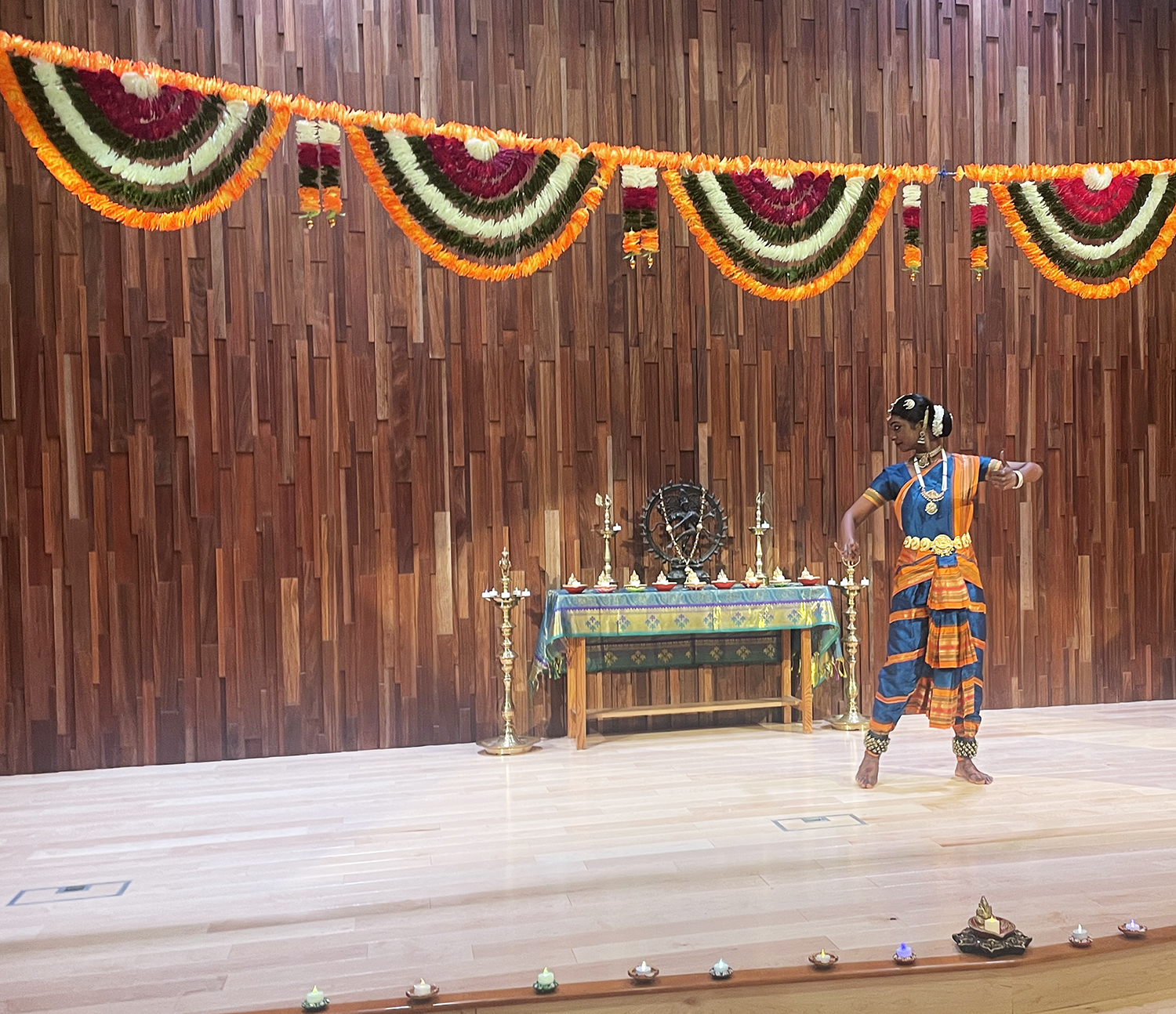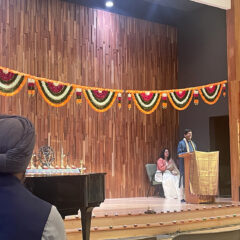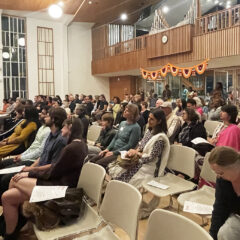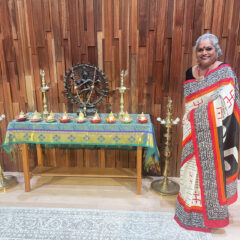
BETHESDA, Md. (RNS) — As he stood at the pulpit on Sunday, the final day of Diwali (Nov. 3), the Rev. Abhi Janamanchi addressed his congregation in the words of one of the oldest Sanskrit mantras, the Gayatri Mantra, said to illuminate and guide the mind toward truth and righteousness.
“Om Shanti, Shanti, Shanti (peace, peace, peace),” chanted the group of more than 100 worshippers in response, their heads bowed. “May we carry forward the light, the strength and the resolve of this sacred celebration,” added Janamanchi, an immigrant from India who describes himself as a “Hindu UU.”
Diwali marks the new year in some traditions, an “opportunity to begin anew, similar to Rosh Hashanah,” said Janamanchi, who pulls tenets from all faith traditions in his sermons. “We say Unitarian Universalism is many windows, one light. While Diwali does have Hindu origins, it transcends a religious perspective. There is a universality in it and a unity, not conformity. It is a unity that is centered in diversity, in our differences.”
Cedar Lane Unitarian Universalist Church, established in 1951 in this suburb on the northern edge of the nation’s capital, was celebrating the Hindu festival of lights in partnership with Hindus for Human Rights, a progressive advocacy organization, adding a call to action to go with the holiday’s traditional dance, food, song and fireworks.
“We are living in critical, troubling and troubled times, and there is a need for us to be coming together in finding ways in which we can recommit ourselves to the work that we are charged with,” said the minister, “to rise up against injustice, to rise up against oppression and to rise up against authoritarianism.”
The line of oil lamps that many Hindus, Sikhs, Jains and Buddhists use to light their homes and temples, said Janamanchi, represent the divine light of truth meant to “guide us through the darkest of times,” he said, including the looming American presidential election. “My faith enjoins me to speak to the moral issues we are confronted with.”
Pranay Somayajula, organizing and advocacy director for Hindus for Human Rights, told the congregation in his address that rather than treat Diwali as an “abstract or detached celebration,” it is important to remember that the ancient holiday’s lessons apply while “we are still grounded here in the real world,” and against the backdrop of injustice across the globe.
“If we are talking about this being a festival of good triumphing over evil, and knowledge over ignorance, and truth over falsehood, that actually has to mean something in terms of how we carry that spirit forward after today, in the way we engage with the world, whatever that looks like for each of us,” said Somayajula.
Celebrated across the worldwide Indian diaspora over a span of five days, Diwali’s significance varies from region to region. Somayajula said Sunday’s event demonstrated the vast diversity of stories told on Diwali, of Lord Rama’s return to Ayodhya after 14 years of exile and victory over Ravana; Lord Krishna’s defeat of the demon Narakasura; and the Sikh observance of Bandi Chhor Diwas, commemorating the release of Guru Hargobind from Mughal imprisonment, along with 52 kings he freed along with him.
At the evening service at Cedar Lane, young children reenacted the battle between Krishna and Naraka, a duo sang Indian and American folk hymns and three Sikh men sang a kirtan, a traditional devotion.
“True Diwali is if we see the lamp as the name of the God, if we see the wick as the name of the God, and the oil as a name of the God, so that the life of the Creator should come to our values,” said Mandeep Singh, one of the kirtan performers.
Mmamohau Tswaedi and Balaji Narasimhan, a couple in their mid-30s from Germantown, Maryland, have been attending Cedar Lane services together since the pandemic and celebrated Christmas and Ramadan there. Tswaedi is the daughter of a Lutheran pastor from South Africa, and Narasimhan is from a religious Hindu family in Chennai, India.

The Narasimhans family brought their baby for his first year of Diwali celebrations on Sunday, Nov. 3, 2024, at Cedar Lane Unitarian Universalist Church in Bethesda, Maryland. RNS photo by Richa Karmarkar
Bringing their 2-month-old son to his first Diwali celebration, the couple feels strongly that this congregation, where they have been “educated on what is out there,” is where their family belongs and where their son will eventually be able to “figure out what he wants to keep and what he wants to give up.”
“The culture where I grew up is very communal, and I find the U.S. is more individualistic, just generally,” said Tswaedi. “So I think spaces where you feel community — not necessarily that look like the community I grew up in, but where you can feel the togetherness — are places that you want to be in. And I think that’s what this space and events like this create. It’s that level of togetherness that transcends, like, one belief or another.”
Diwali is not new to Cedar Lane. Students at Lakshmi Swaminathan’s Natanjali School of Dance have been dancing Bharatanatyam, a traditional Indian form, at Cedar Lane’s celebrations for almost a decade. In 2010, they performed at the Washington National Cathedral, dancing to music of Hindu gods and goddesses in front of Jesus on the cross. For their teacher, the performance yielded a profound realization. “God is one. When you’re connecting with God, where you are doesn’t matter,” she said. “Whether you’re in a church or in the basement of your home, God is within you.”
It was the first Diwali for Beth Brofman, a member of the UU fellowship for the past month. A long-time member of a Dutch Reformed Church in New York, Brofman sought a more diverse and socially active spiritual community on moving to Bethesda, happily trading “How Great Thou Art” for “Get Up, Stand Up” by Bob Marley, she said, the latter of which played after Sunday’s sermon.

Congregants huddled outside to paint rangoli, or colorful mandala patterns, with chalk after the Diwali service on Sunday, Nov. 3, 2024, at Cedar Lane Unitarian Universalist Church in Bethesda, Maryland. RNS photo by Richa Karmarkar
After researching the correct greeting for Diwali, and the most auspicious colors to don, Brofman said her first Diwali came at the perfect time.
“I’m actually needing to distract myself and to be around other people who will reflect my values,” said Brofman, a retired social services worker whose level of anxiety has reached that of the 2016 elections, when she was a canvasser. “Regardless of what happens on Tuesday, we will have that community of like-minded individuals who will continue to advocate for the things I consider important. You know you’re not alone, and the people we know are way more important.”
Janamanchi agreed and said Sunday’s celebration was well timed. “The ‘Narakas’ of the world are pretty active,” he said, citing the evil figure battled by Lord Krishna and his queen, Satyabhama, in Hindu lore. “Like Krishna and Satyabhama, we can recognize that we’re not in this alone, that together, we can overcome, overcome evil, overcome oppression and overcome injustice.”
“In all of this, there is joy,” he added. “Joy is not the opposite of sorrow. Joy is present even through sorrow and challenge and despair and hopelessness. And to me, those are also messages that Diwali presents us with. So if there is one thing I want people to take away, it is joy.”



